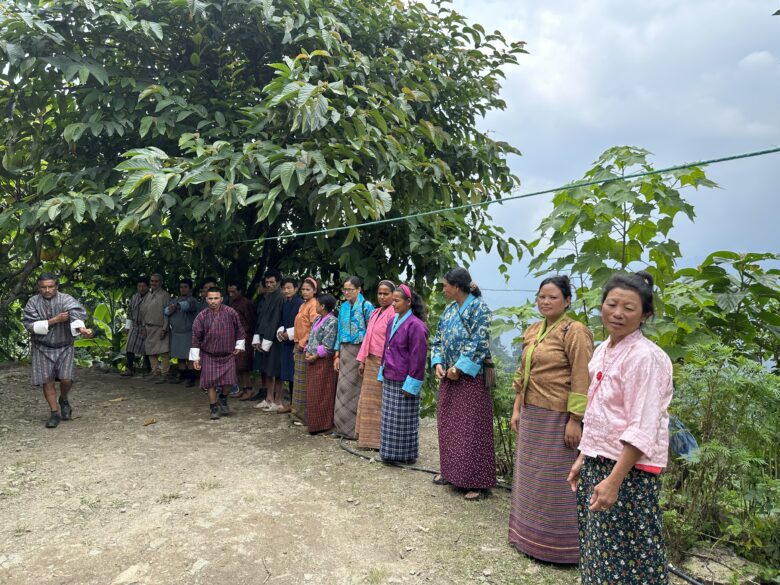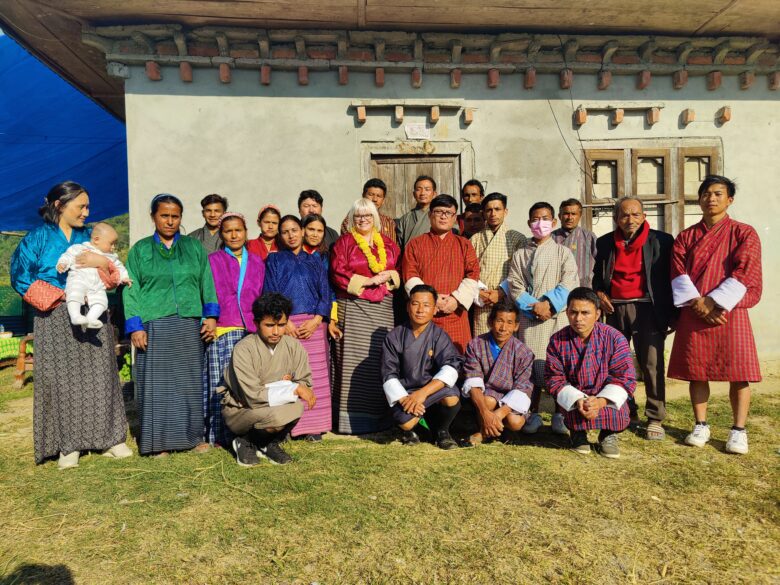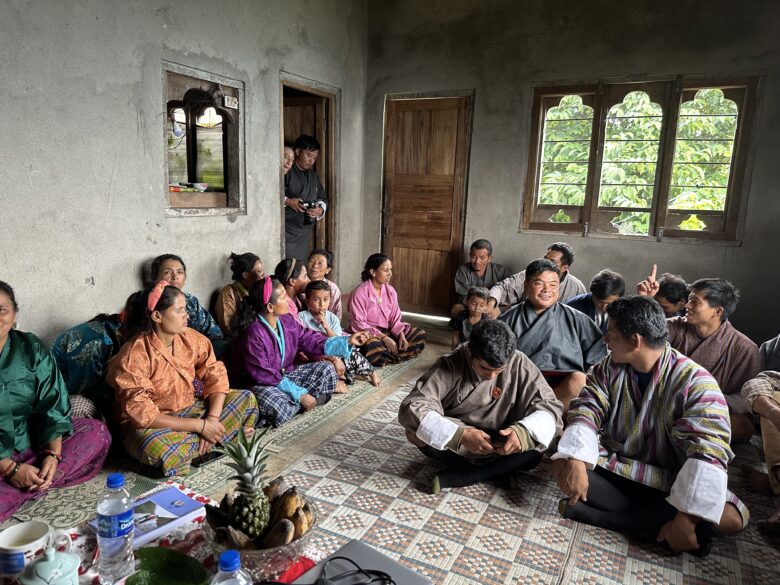Bhutan’s new partnership: a mushroom farm brings opportunities to a mountain village

A Bhutanese village community grows oyster mushrooms with Finnish funding. The mushrooms will provide a valuable addition to their diet, and in the future, new income for the villagers.
If Bhutan, surrounded by the Himalayan mountains, is unfamiliar to many, the village of Chongaykha on the India-Bhutan border is even more so, even to most Bhutanese. In fact, in the lifetime of the villagers, no one from the capital Thimphu has ever visited the village, which lies along an inaccessible route. The nearest city is Phuntsholing, Bhutan’s second largest city, in the south of the country. Due to poor road conditions, some villagers only leave the village for Phuntsholing once in the summer. In winter, road conditions are little better.
However, the small village of Chongaykha has now been visited by at least one foreigner, Riina Happonen from Finland, who works as Fida’s Country Programme Coordinator in Bhutan. Happonen visited the oyster mushroom cultivation project, which was launched in the country a year ago with funding from Fida and the Finnish Ali and Tuja Nylund Foundation.
– We chose this village for the project because the villagers were very active and wanted to improve life in their village. This remote community was selected from the province to help them grow more diverse food and create a livelihood for themselves from mushroom farming, says Riina Happonen in a telephone interview.
Sometimes an excavator was repairing the road so we could drive to the village.
A memorable journey
The journey of less than 200 kilometers to a remote village took more than four hours in each direction by car, even though the car was designed for rough roads.
– The villagers had tried to improve the road by filling in gaps with cow dung, and you could smell it. At times, the bumpy, narrow road was completely blocked due to a landslide and an excavator was making way for us to reach the village. At one point we had to reverse a long stretch because the road was so narrow that we couldn’t turn around at the junction. Few people own a car in that area, and many wanted to get a ride from us, they would climb on the roof of the car and travel part of the way with us, Riina Happonen described the journey as something she had not experienced before during her five years in Bhutan.

The welcome from the village community was particularly warm. Visitors were given a white scarf around their necks as a mark of respect and were served the best food the village had to offer, including mushrooms this time, of course.
– We ate oyster mushrooms cooked on an outdoor fire, grown by the villagers, along with chilli, rice and chicken slaughtered for us. The meal was followed by a group discussion about the life and challenges of the community. We also collected feedback on the mushroom cultivation training. Together we planned and considered how villagers could make better use of their new skills commercially.
Local food from valuable raw materials
The villagers said that growing mushrooms was new to all of them, and not easy for first timers, but after the first trial period, they had it down pat. Community members were very grateful for the opportunity they were given and now they continue to grow mushrooms all year round. The village community had never received any help with farming before, and they said that none of the provincial government officials had ever visited their community.
Riina Happonen says that mushroom farming is suitable for Bhutan and makes sense in many ways. The mushrooms are grown organically, so there is no need for chemicals. They are a climate-sustainable way to produce nutrient-rich food. In addition, locals get local food instead of imported food from India. The mushrooms are also intended to provide additional income for the villagers, which is needed, for example, to cover school fees for their children. Mushrooms are a relatively valuable commodity in Bhutan, with the potential to become a profitable product.

Riina Happonen says that men were the main voices at the village meeting, and when Happonen asked women to talk about their experiences, a couple of them dared to speak.
– When the event was over and I went outside, women gathered around me. They told me that they could not say the things they wanted to say inside. The people in the village are Hindus and the women told me that they were not allowed to speak when older men from the village were present. This was new thing for me. Fida works in areas where most of the population is Buddhist. Women are active in those communities, and I am used to talking to women. There is a different hierarchy in the Hindu community in this village. The effects of the caste system are still visible.
We invite all villagers to participate, including men. It is important that they too are taught about equality. That way the situation will slowly start to change, says Riina Happonen
Happonen says that Fida will visit the community again. Training sessions on sexual and reproductive health, children’s rights and equality have been agreed with the village community.
– It is important that they also receive training on gender equality. This way the situation will slowly start to change, says Riina Happonen.
More than ten years of cooperation
New types of products and packaging will also be developed together with villagers to ensure that villagers can market their products in the future. The provincial leader also promised villagers a marketplace where they can sell their products.
Next time, the Christian community living above the Hindu community will also be invited.
The trainings will be held with Fida’s support by Fida’s local partner, RENEW, an organisation founded by the Queen Mother of Bhutan to prevent gender-based violence and help victims of domestic violence. Shelters and activity centers are currently operating in five provinces, with the aim of expanding to 20 provinces and providing easy access to therapy and vocational training services.
Cooperation with RENEW has been going on for a long time. Fida has been the only Finnish NGO working in Bhutan since 2011.
Main image: the residents of Chongaykha gathered to meet the Fida staff visiting their village. When Riina and her colleagues arrived, they were greeted by the whole village. Photographer Lekzin Tobgyel.
